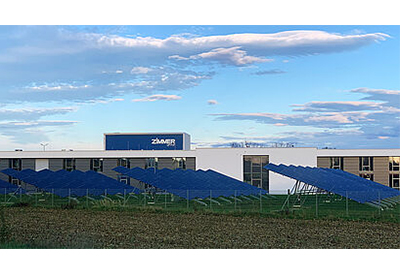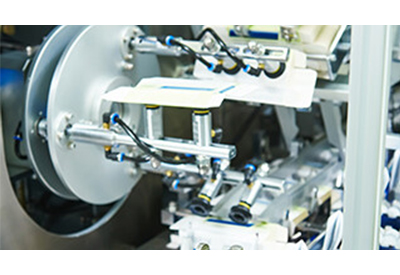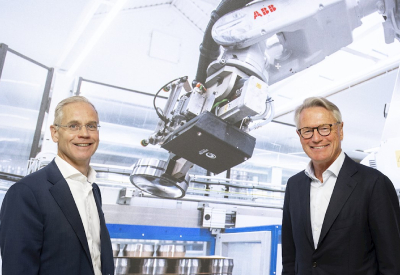New ABB Study on Industrial Transformation Unveils Critical Relationship Between Digitalization and Sustainability

February 17, 2022
- •“Billions of better decisions” highlights the role of Industrial IoT solutions in reaching sustainability goals while empowering the industrial workforce
- •International survey of 765 decision-makers reveals that while 96 percent believe digitalization is “essential to sustainability,” just 35 percent have implemented Industrial IoT solutions at scale
- •72 percent of companies are increasing investment in Industrial IoT specifically to address sustainability aims
ABB recently released the findings of a new global study of international business and technology leaders on industrial transformation, looking at the intersection of digitalization and sustainability. The study, “Billions of better decisions: industrial transformation’s new imperative,” examines the current take-up of the Industrial Internet of Things (IoT) and its potential for improving energy efficiency, lowering greenhouse gas emissions and driving change. The goal of the new ABB research is to spur discussion within industry regarding opportunities to leverage the Industrial IoT and empower companies and workers to make better decisions that can benefit both sustainability and the bottom line.
“Sustainability goals more and more are a crucial driver of business value and company reputation, and Industrial IoT solutions are playing an increasingly important role in helping enterprises achieve safe, smart and sustainable operations,” said Peter Terwiesch, President of ABB’s Process Automation business area. “Unlocking insights hidden in operational data holds the key to enabling literally billions of better decisions throughout industry and acting upon them, with significant gains in productivity, reduced energy consumption and lower environmental impact.”
The study, commissioned by ABB, found that an organization’s “future competitiveness” is the single greatest factor – cited by 46 percent of respondents – in industrial companies’ increased focus on sustainability. Yet while 96 percent of global decision-makers view digitalization as “essential to sustainability,” only 35 percent of surveyed firms have implemented Industrial IoT solutions at scale. This gap shows that while many of today’s industrial leaders recognize the important relationship between digitalization and sustainability, the adoption of relevant digital solutions to enable better decisions and achieve sustainability goals needs to accelerate in sectors like manufacturing, energy, buildings and transport.
Further key learnings from the study
- •71 percent of respondents reported greater priority given to sustainability objectives as a result of the pandemic
- •72 percent said they are “somewhat” or “significantly” increasing spending on Industrial IoT due to sustainability
- •94 percent of respondents agreed the Industrial IoT “enables better decisions, improving overall sustainability”
- •57 percent of respondents indicated the Industrial IoT has had a “significant positive effect” on operational decision-making
- •Perceived cybersecurity vulnerabilities are the #1 barrier to improving sustainability through the Industrial IoT
Win-win scenarios with the Industrial IoT
With 63 percent of executives surveyed strongly agreeing that sustainability is good for their company’s bottom line, and 58 percent also strongly agreeing it delivers immediate business value, it’s clear that sustainability and traditional priorities of Industry 4.0 efforts – speed, innovation, productivity, efficiency, customer-centricity – are increasingly intertwined, opening up win-win scenarios for companies looking to drive efficiency and productivity while making strides on climate change.
“The International Energy Agency estimates that industry accounts for more than 40 percent of global greenhouse gas emissions today,” said Terwiesch. “If we are to reach climate objectives such as the UN’s Sustainable Development Goals and the Paris Agreement, industrial organizations need to implement digital solutions as part of their sustainability strategies. Embracing these technologies at all levels – from the boardroom to the facility floor – is key, as every member of the industrial workforce can become a better decision-maker when it comes to sustainability.”
ABB innovations for sustainability
ABB is committed to leading with technology to enable a low-carbon society and a more sustainable world. Over the past two years, ABB has reduced greenhouse gas emissions from its own operations by more than 25 percent. As part of its Sustainability strategy 2030, ABB expects to be fully carbon neutral by decade’s end and to support its global customers in reducing their annual CO2 emissions by at least 100 megatons by 2030, the equivalent of removing 30 million combustion cars from the roads each year.
ABB’s investments in digital capabilities are core to this commitment. With more than 70 percent of ABB’s R&D resources dedicated to digital and software innovations, and a robust ecosystem of digital partners, including Microsoft, IBM and Ericsson, the company has established a leading presence in Industrial IoT.
The ABB AbilityTM portfolio of digital solutions enables a host of industrial use cases to power improvements in energy efficiency, resource conservation and circularity, including condition monitoring, asset health and management, predictive maintenance, energy management, simulation and virtual commissioning, remote support and collaborative operations. Examples of ABB’s more than 170 Industrial IoT solutions include ABB AbilityTM Genix industrial analytics and AI suite; ABB AbilityTM Energy and Asset Manager; ABB AbilityTM Condition Monitoring for Powertrains; and ABB AbilityTM Connected Services for industrial robots. To learn more about ABB Ability, visit: https://global.abb/topic/ability/en
To continue the conversation on this important topic, ABB will host an industry webinar on Wednesday, March 2, focused on the convergence of digitalization and sustainability, and how the Industrial IoT and related technologies can help save energy, conserve resources, and improve safety for personnel and communities. Leading technology journalist and climate investor Molly Wood will moderate this virtual panel discussion featuring senior executives, best-selling authors and other thought leaders to explore this convergence and how industrial organizations can empower better, more sustainable decision-making throughout the enterprise.





